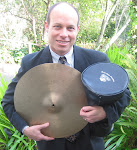 |
| Chess Grandmaster Judit Polgar |
Hembrick and Moss disagree. They write: "Research has shown that intellectual ability matters for success in many fields — and not just up to a point."
A longitudinal study by Lubinski and Benbow compared the accomplishments of youth that scored in the 99.9 percentile of SAT score versus those that scored "only" in the top 99.1 percentile. Those in the 99.9 percentile
"were between three and five times more likely to go on to earn a doctorate, secure a patent, publish an article in a scientific journal or publish a literary work. A high level of intellectual ability gives you an enormous real-world advantage."Similarly, Hembrick and Moss have found that working memory capacity predicts better performance in music sight reading and other complex activities.
The research doesn't mean that practice is unimportant. It just must be balanced by the fact that talent matters too.
I find this research to be comforting. I no longer need to blame myself for not becoming a chess master or marimba virtuoso. I no longer need to say to myself, "Ah, if I had only practiced longer." I didn't have enough natural ability to be a star, but I put in enough hard work in these fields to be competent.




No comments:
Post a Comment